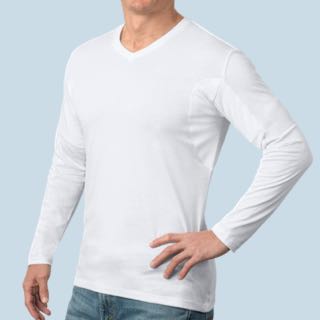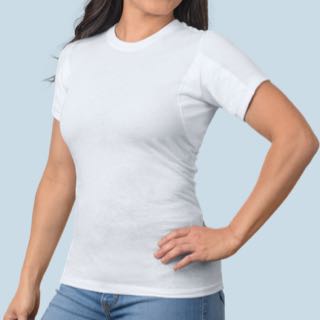Puberty Sweat: The Smelly Truth About It & How to Control It
Asking a crush out for the first time. Failing a test. Prom night.
Puberty is an annoying, exciting time in your life when everything changes. Body parts evolve, hair grows in new places and hormones on overdrive make you feel all the feels. While sweating during puberty is common for boys and girls, it's one of those changes that's not talked about enough.
The teenage years are difficult enough without having to sweat through them, too. Teenagers experience many cringe-worthy moments during middle school and high school. And while sweating is perfectly normal, there are times when excessive sweating becomes an issue.
Today we're covering everything you need to know about sweating during puberty — why it happens, how to identify it, and how to stop it from taking over your life.
- Why you experience sweating during puberty
- Hyperhidrosis in teens
- Puberty sweat signs
- 4 ways to keep puberty sweating under control
Why You Experience Sweating During Puberty
Is sweating a sign of puberty? It can be, yes. Puberty is one of the leading causes of excessive teen sweating.
There are two types of sweat glands in our bodies: eccrine and apocrine.
- Eccrine glands produce odorless sweat to prevent your body from overheating.
- Apocrine glands continuously release sweat, but emotions like fear, nervousness and excitement make them sweat even more.
In girls between the ages of 8-13 and boys between 9-15, puberty hormones stimulate the apocrine sweat glands in the armpits and genital areas. Apocrine sweat is a white, milky fluid containing proteins and lipids that bacteria feed on — releasing the unpleasant smell you know as body odor.
As many as three million apocrine glands activate during puberty. As a result, you sweat from more places than ever before, and thanks to hormones, you experience a new range of emotions.
Think of it this way: apocrine glands + new emotional stressors = more sweat.
Did you know?
While sweating is expected during puberty, it's important to note if it becomes excessive.
When Does Puberty Sweat Stop?
Excessive sweating in teens generally subsides at the end of puberty: age 14 for girls and age 16 for boys. However, puberty happens in stages and is different for everyone – some experience changes up to age 20!
Hyperhidrosis in Teens
If you’re a teen experiencing sweating beyond normal standards, you could have hyperhidrosis. Approximately 365 million people worldwide (5% of the population) have hyperhidrosis - or chronic sweating.
Hyperhidrosis is a medical condition that causes nerves to trigger sweat glands into hyperactivity. As a result, you sweat even when your body doesn't need to.
Hyperhidrosis symptoms include:
- Constantly wiping sweat away
- Night sweats that keep you awake
- Having to change clothes several times a day
- Poor concentration in school
- Avoiding physical contact or social activities due to sweat
Hyperhidrosis symptoms go far beyond sweat stains and ruined clothing. Excessive, uncontrollable sweating can cause embarrassment, isolation, and even anxiety or depression in some people. If you sweat heavily and find that it affects your daily life, it’s crucial to take steps to manage sweating.
Does Hyperhidrosis Go Away After Puberty?
Since hyperhidrosis is a medical condition, you may have had it since birth and not know it. See a doctor for treatment options if your sweating is severe and does not stop at the end of puberty.
Puberty Sweat Signs
Puberty sweat is considered one of the later signs of puberty, beginning about one year into puberty. The average age for girls to start experiencing puberty sweat is 11; the average age for boys is 12. Here are some signs that you’re experiencing puberty sweat.
Your Sweat Starts to Smell
One way to tell if you're sweating due to puberty is if you detect an intense, oniony odor. This is because when you sweat, the bacteria break down proteins in your sweat and produce a pungent scent.
You Sweat in Nerve-Wrecking Situations
One of the first signs of puberty sweat is sweating in nerve-wracking or tense situations. For example, you may notice for the first time in your life that you get sweaty during big presentations at school, dances or on dates. It's called stress sweat.
Because stress sweat hits when you least expect it, dealing with it can be embarrassing. You may isolate yourself from your peers or avoid social situations for fear of sweat. And because sweating during puberty happens in your teen years, bullies might be an issue too.
You may also notice pit stains on your shirts — wet marks, rings or yellow and white blotches that appear out of nowhere. These are all stress sweat and puberty-related.
You Sweat for No Reason
When you're a child, exercise and heat are the body's only sweat triggers. You know exactly when you're going to sweat and when you aren't. (Soccer practice = yes, walking to class = no.) But once you hit puberty, things are a bit different.
Because the apocrine glands continuously release sweat, sometimes it feels like you're sweating for no reason. Physical tasks that would have never made you sweat as a child suddenly leave you drenched.
When you exert yourself during puberty, you sweat from your eccrine glands and apocrine glands — which turns into a lot of sweat altogether.
You Sweat in Specific Places
Do you sweat in specific places, like your armpits and groin? The high concentration of apocrine sweat glands in these areas causes these areas to sweat more. In addition, certain forms of hyperhidrosis can cause sweaty hands (palmar hyperhidrosis) and feet (plantar hyperhidrosis).
4 Ways to Keep Puberty Sweating Under Control
Other resources will offer tips like “shower several times a day” or “try to relax.” But this advice can be misleading, ineffective and doesn’t effectively address the problem of heavy teen sweating or hyperhidrosis. Besides, who has the time to shower several times a day?
Here are four tips to keep puberty sweating under control.
1. USE PRESCRIPTION-STRENGTH ANTIPERSPIRANT
If you’re already using an antiperspirant but it doesn’t seem to work, you may need something stronger. Prescription-strength antiperspirants can block sweat more effectively. You can get a prescription from your doctor or find clinical-strength antiperspirants at stores like Target and Walmart.
In either case, make sure to follow the application directions carefully. It may take a few weeks to see results as your body adjusts to the formula.
Remember, antiperspirant is different from deodorant. While deodorant prevents body odor, antiperspirant plugs your sweat glands to block sweat. So choose an antiperspirant/deodorant to block wetness and odor for the best results.
Check out the best deodorants for teenage boys and teenage girls.
2. KEEP EXTRA CLOTHES HANDY
It’s helpful to keep extra clothes handy if puberty sweat is a problem. Because stress sweat tends to occur out of the blue, keeping an additional shirt or two in your backpack or locker is a good idea.
In addition, wearing a sweat proof undershirt is a good backup against excessive moisture and odor. However, not all undershirts are created equal.
A good sweat proof undershirt made of natural fibers can trap sweat and stop sweat marks from creeping through your clothes. Check out the Thompson Tee, available in men's and women's styles.
Made with patented Hydro-Shield® technology, Thompson Tees protect you from the most noticeable and embarrassing side effects of puberty sweating. You can wear it as a T-shirt or an undershirt beneath your clothes to stop embarrassing pit stains.
3. TRY NATURAL SWEAT TREATMENTS
Although antiperspirants are safe to use, you may want to try a natural sweat solution.
Luckily, there are many home remedies to reduce sweat. For example, vinegar, baking soda, cornstarch or lemon juice applied to the underarms can effectively combat sweat-causing bacteria. In addition, drinking black tea, green tea, wheatgrass juice and tomato juice also help squelch sweat.
4. TALK TO YOUR DOCTOR ABOUT MEDICATIONS AND ANTI-SWEAT PROCEDURES
Talk to your parents and doctor if you’ve tried all the options but still sweating too much. They can help you explore treatment options like prescription-strength antiperspirants, oral medications, Botox injections for underarm sweating, miraDry, and iontophoresis.
Unfortunately, these treatments can be expensive and health insurance doesn't always cover them. They also require continuous upkeep and aren't guaranteed to be successful.
Try a Thompson Tee to Battle Teenager Sweating
If you’re a teenager dealing with excessive sweating, you may also be dealing with social and psychological side effects, from depression, self-isolation, and ridicule to low self-confidence. However, it’s important to know that hyperhidrosis is manageable and doesn't have to rule your daily life – even after puberty.
Billy Thompson and Randy Choi, the guys who created Thompson Tees, feel your pain. They invented their sweat proof tee shirts to find a safe, affordable and convenient solution to hyperhidrosis symptoms.
Try a Thompson Tee risk-free today!


